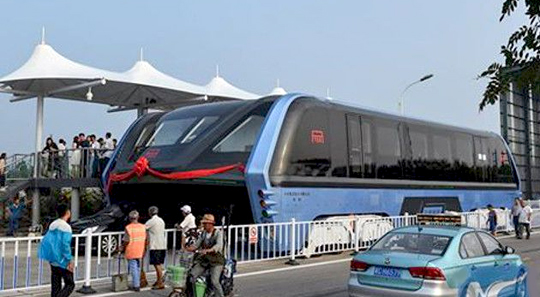Beijing, Aug 8: China's "straddling bus", trumpeted as an innovative idea to deal with traffic jams, is facing increasing scrutiny with many questioning the vehicle's safety features and whether it would ever come into service, a media report said today.
The Transit Elevated Bus (TEB), grabbed worldwide attention last week after China's official published pictures of the vehicle during a test run on a 300-metre track in Qinhuangdao city in Hebei province.
The bus is designed to run on rails and rises two metres above the road, allowing cars to pass underneath to ease congestion.
While the state-run Xinhua suggested last week the project was an excuse to raise funds rather than create an innovative solution to traffic problem, the experts have also questioned the safety and practicality of the technology, Hong-Kong based South China Morning Post reported.
It would be difficult for the bus to negotiate turns and motorists driving under it would have their line of sight severely limited, increasing the chance of accidents on the road, said Sun Zhang, a transportation professor at Tongji University in Shanghai and an expert in urban track transport systems.
"It can only run on wide and straight roads. In big cities where roads are winding and jammed [with traffic], such roads are in shortly supply. The biggest advantage of this project is that its designers have rich imaginations," he said.
Several employees of the TEB at Qinhuangdao city draped the bus with black curtains to prevent bystanders looking at the vehicle as the project has kindled the interest of curious local residents, the report said.
Also the idea of a bus to ease road congestion is attractive in China where car ownership is rapidly increasing, along with the number of traffic jams.
China had 172 million cars on the road at the end of last year, with 280 million licensed drivers. Research by the car-hailing service Didi Chuxing, based on data gathered in 400 Chinese cities, said the average car speed was less than 25 kmph in the first half of this year, the report said.
The publicity has created a wave of interests specially among the investors. After a series of media reports in China have questioned the technological viability and the feasibility of the project, some investors worried about the scheme to come down to check out the site.
"The company and the project are beset by so many questions. We are all worried," Zhang Ying, an investor, said
He has invested about 500,000 yuan (USD 75085) into Huaying after its sales staff told him annual returns could be as high as 14 per cent, the report said.
Yao Xu, an official in charge of press inquiries at TEB Technology told 'Morning Post' that an "official test run" would be arranged in the coming weeks.







Comments
Add new comment